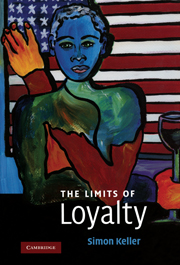Book contents
- Frontmatter
- Contents
- Preface
- Acknowledgements
- Chapter 1 What is loyalty?
- Chapter 2 Friendship and belief
- Chapter 3 What is patriotism?
- Chapter 4 Against patriotism
- Chapter 5 Filial duty: debt, gratitude and friendship
- Chapter 6 Filial duty: special goods and compulsory loyalty
- Chapter 7 Is loyalty a value? Is loyalty a virtue?
- Chapter 8 Communitarian arguments for the importance of loyalty
- Chapter 9 Josiah Royce and the ethics of loyalty
- Chapter 10 Disloyalty
- Conclusion
- Postscript: universal morality and the problem of loyalty
- Bibliography
- Index
Chapter 1 - What is loyalty?
Published online by Cambridge University Press: 22 September 2009
- Frontmatter
- Contents
- Preface
- Acknowledgements
- Chapter 1 What is loyalty?
- Chapter 2 Friendship and belief
- Chapter 3 What is patriotism?
- Chapter 4 Against patriotism
- Chapter 5 Filial duty: debt, gratitude and friendship
- Chapter 6 Filial duty: special goods and compulsory loyalty
- Chapter 7 Is loyalty a value? Is loyalty a virtue?
- Chapter 8 Communitarian arguments for the importance of loyalty
- Chapter 9 Josiah Royce and the ethics of loyalty
- Chapter 10 Disloyalty
- Conclusion
- Postscript: universal morality and the problem of loyalty
- Bibliography
- Index
Summary
THE QUESTION
There are different things to which you can be loyal and different ways in which you can be loyal. The way you feel and act towards your spouse, for example, is probably quite different from the way you feel and act towards your favorite football team, even though both are manifestations of loyalty.
This chapter begins to formulate a definition of loyalty, looking at what it is that all loyalties have in common, and how loyalties can differ in object and type while still counting as loyalties.
As far as possible, I want to answer these questions without prejudging or second-guessing our everyday uses of the concept. In telling a story about the nature of loyalty, there is a temptation to try to guarantee that anything that really counts as a loyalty will be something valuable, or something that deserves our approval. But I do not think that we should begin from the assumption that loyalty is, or ought to be made to look like, something that answers to certain independent evaluative standards. The first goal is to reach a better understanding not of true or good or sensible or rationally defensible loyalty, but just of loyalty.
Loyalty is sometimes spoken of as a character trait, as when we say that a particular person is, as well as being brave and clever, loyal. We can also speak of loyalty as a principle or ideal.
- Type
- Chapter
- Information
- The Limits of Loyalty , pp. 1 - 23Publisher: Cambridge University PressPrint publication year: 2007
- 1
- Cited by



